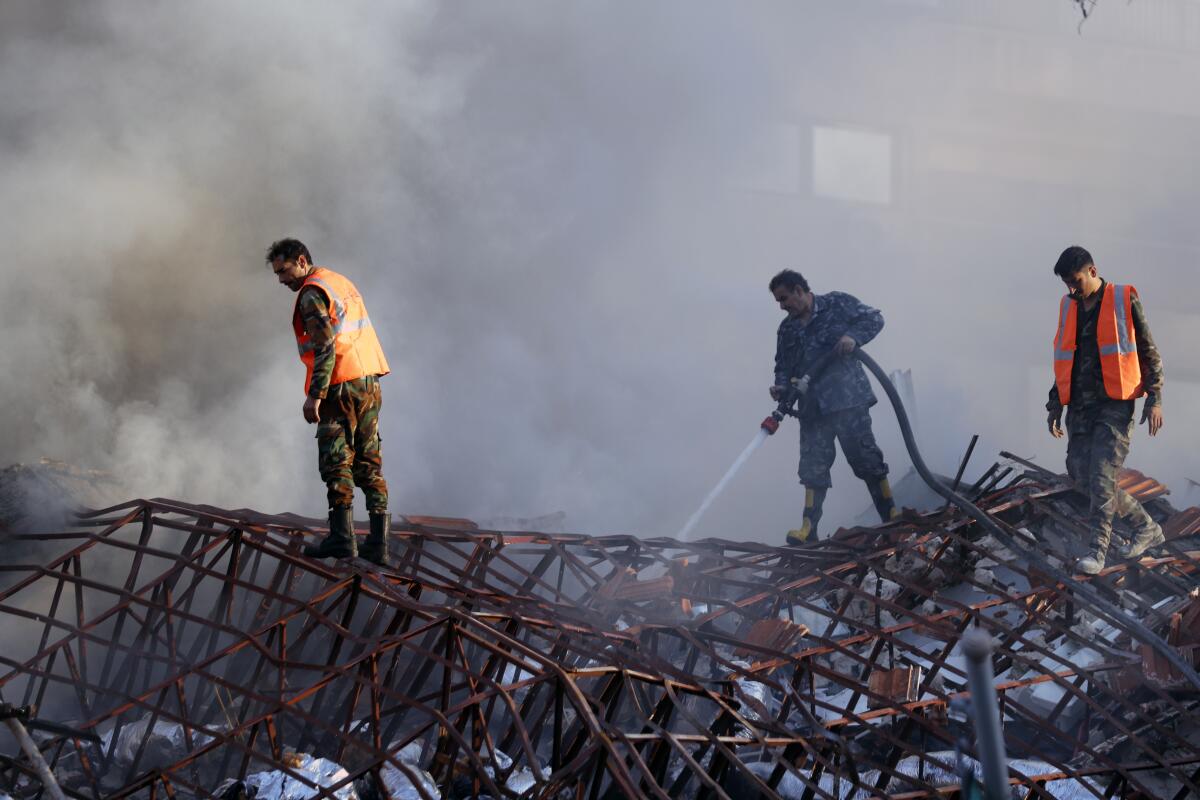News Analysis: Can both sides declare victory in Iran-Israel clash?

WASHINGTON — In a bid to avert wider war in the Middle East, the United States and other world leaders are urging Israel to see victory in its unprecedented military face-off with Iran over the weekend. It’s unclear whether Israel will follow that script, but Iran appears to be doing so, with its government claiming success.
After years of proxy battle, Iran launched an attack from its own territory into Israel for the first time, sending waves of land-attack cruise missiles, more than 100 ballistic missiles and a battery of “killer drones.”
Israel, in turn, mounted a formidable defense and emerged almost unscathed, intercepting or shooting down nearly all of the munitions with its air defense system and help from U.S. and British warplanes as well as Jordan. Saudi Arabia is believed to have let Israel’s allies use its airspace.
The Biden administration praised Israel’s “spectacular defeat” of the Iranian assault.
“This was an incredible success, really proving Israel’s military superiority and just as critically, their diplomatic superiority, that they have friends in the region, that they have around the world that are willing to help them,” said White House National Security Council spokesman John F. Kirby.
He noted the military support from a coalition of several countries that rallied to help defend Israel despite widespread anger and international isolation over Israel’s conduct of the 6-month-old war in the Gaza Strip.
Outraged over the war in Gaza, protesters gather every night near the Israeli Embassy in Jordan’s capital to demand an end to peace agreements with Israel.
The coalition is fragile. Countries such as Jordan, which acknowledged it shot down a number of what it called “flying objects” that trespassed in its airspace, want to remain in good favor with Israel and its main backer, the United States, but also cannot risk the wrath of Iran.
Moreover, U.S. officials do not want an Israeli response now to further increase bloodshed across the region.
Already, the war in Gaza has claimed thousands of Palestinian lives and cost the Biden administration political capital here and abroad.

In a telephone call with Israeli Prime Minister Benjamin Netanyahu late Saturday, President Biden again offered “iron-clad” support in Israel’s defense, but cautioned that U.S. forces will not be part of any offensive action Israel might take against Iran, according to administration officials familiar with the conversation.
“No one wants to run up the escalation ladder,” a senior administration official said, briefing reporters Sunday on condition of anonymity to discuss internal discussions. “Israel has to think carefully what it does next.”
Some Israeli public figures are also urging caution, amid cries for urgent revenge from right-wing members of Netanyahu’s government.
Israel could leverage an improved military and diplomatic standing to find “a more creative and sophisticated way to respond, perhaps at a later stage and in line with previous covert actions it took against Iran, which will better serve its national interest,” said Nimrod Goren, a senior fellow for Israeli affairs at the Middle East Institute in Washington.
In Israel, Netanyahu’s war Cabinet on Sunday declared Israel would respond to Iran “in a way and time that suits us,” as member Benny Gantz said. And it will be a surprise, he said.
Iran’s attack was anything but a surprise.

Since the April 1 assassination of a commander of the Islamic Revolutionary Guard Corps and six other officers in an airstrike on a diplomatic compound in Damascus, Syria — an attack attributed to Israel — Iran has steadily promised revenge. In the days leading up to last weekend’s overnight operation, Iran had informed some countries in the region that it was planning an attack, and the first drones were launched hours before they reached Israeli airspace, giving U.S. and Western spy satellites plenty of time to detect and track the incoming fusillade.
Several countries who have cordial relations with Iran, such as Turkey and Lebanon, urged “de-escalation” by both Israel and Iran.
Iran said Sunday that its retaliation for the April 1 incident was completed. In the telling of officials there, the strike was an awesome display of military might that was also calibrated so as to not tip the region into all-out war. Iran supporters also pointed out that Israel needed the active help of no fewer than five nations to stop the onslaught and that it could not do it on its own.
They have taken pride in the fact that the strike crossed what has been something of a red line for the last 40 years of hostility between Israel and Tehran: direct fire from Iranian soil to Israeli soil.
Iran had long relied on factions in Iraq, Syria, Lebanon and Yemen to carry out attacks on Israel.
Critics, on the other hand, said that the fact almost all the ordnance was shot down — or never even made it out of Iranian airspace — proved the inferiority of Iran’s arsenal, and that in any case the whole matter was a charade that left Iran looking like the lion that squeaked.
Some analysts said Iran had to know its hundreds of missiles were going to get intercepted and was being careful to not inflict too much damage to temper Israeli response. Iran also does not want a broader war, one that would suck in the United States.
But the administration official who briefed reporters Sunday cast doubt on such a calculation. Iran “clearly intended to inflict significant damage and death,” the official said. Israel reported some damage at an air force base and the wounding of a Bedouin child.
Throwing so much of its best materiel at Israel with so little physical impact could be an embarrassing setback for Iran.
On Monday, Iranian Foreign Ministry spokesman Naser Kanani described the attack as “necessary, proportional, and aimed at military targets” to establish “deterrence capability,” according to news agency reports from Tehran. Kanani added that Iran “does not seek to escalate tensions in the region.”
At the same time, Iran has warned that if any country assisted Israel in a counteroffensive, there would be consequences.
On Sunday, an unnamed military source was quoted in Iran state news criticizing Jordan for its “movements during the punitive attacks” and saying that backing Israel would make it “the next target.”
That same day, the Jordanian Foreign Ministry called in the Iranian ambassador and upbraided him for “getting involved in Jordan’s internal affairs” and for “casting doubt on Jordan’s positions” on Israel, Jordanian Foreign Minister Ayman Safadi said in an interview with Al-Mamlaka TV.
“Iran’s problem is with Israel and not with Jordan,” he said. “Neither Iran nor anyone else can outbid what Jordan is doing, what it is offering, and what it has provided historically for the sake of Palestine.”
Jordan billed the shoot-downs as as a military intervention meant to preserve national sovereignty and the safety of the country’s citizens. Safadi said that Jordan would have done the same if the missiles were fired by Israel toward Iran.
Complicating matters for Jordan’s government, the events of the weekend only added to the anger of many citizens who oppose diplomatic relations with Israel because of its conduct in the war in Gaza. Many Jordanians have Palestinian roots, and activists have been mocking online what they view as their government’s willingness to defend Israelis while letting Palestinians die.
Now the world waits to see whether Israel will be content with having repelled the attack by Iran — or if it will respond militarily.
Jonathan Spyer, research director at the U.S.-based Middle East Forum, suggested that Israel might be compelled to act because it cannot allow Iran, or the region, to regard retaliatory attacks on Israeli territory as a new normal.
Israel won’t want to “take the win,” as it’s being urged to do by the U.S. and others, he said. “From the Israeli perspective, a ‘win’ is not blocking the blow, but what you do after the blow.”
Wilkinson reported from Washington and Bulos from Beirut.
More to Read
Sign up for Essential California
The most important California stories and recommendations in your inbox every morning.
You may occasionally receive promotional content from the Los Angeles Times.













